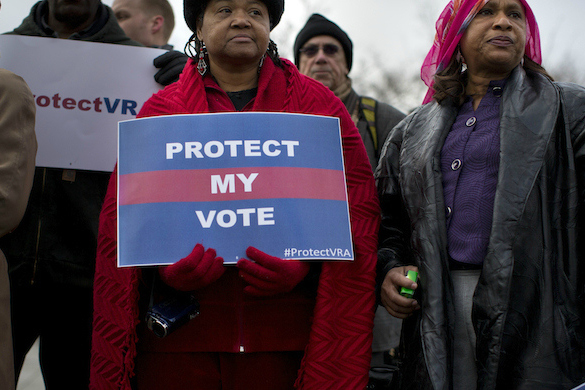
While greatly disappointed the U.S. Supreme Court took the teeth out of the 1965 Voting Rights Act this Tuesday, civil rights advocates said they would use the death of the law as a chance to mobilize progressives to protect minority rights to vote.
The first order of business for the civil rights community is to get Congress to pass a constitutional amendment guaranteeing the right to vote, said civil rights advocates on a conference call Wednesday organized by ColorOfChange.org, an online civil rights organization that works to empower Black America’s political voice.
“The only way to guarantee free elections is one national system for everyone,” said Rashad Robinson, Executive Director of Color of Change.org. “We need a constitutional amendment for the right to vote.”
Robinson said that while the U.S. Constitution talks broadly about voting, it lacks a specific guarantee for the freedom to vote. He said that with 13,000 separate voting districts around the country, there are 13,000 different ways that elections are conducted, opening the doors to discriminatory practices to disenfranchise minority voters. “Under this patchwork system, the states can make up there own rules,” Robinson added.
In many respects, the call was more of a eulogy for the Voting Rights Act that was effectively killed by the High Court at the age of 48.
It was a history of discrimination in voting that led to the 1965 Voting Rights Act, which is widely credited with ensuring voting rights for minorities in mostly southern states with a history of suppressing black voter turnout. The Supreme Court, however, found on Tuesday that, since significant advances have been made in protecting minority voting rights, the law needed to be reexamined by striking down its key Section 4 provision.
But civil rights lawyers like Judith Browne Dianis, Co-Director of the Advancement Project, said the law is still needed to protect voting rights today. She said that while the law has blocked more than 1,500 discriminatory laws since 1965, it was used five times last year alone to block laws that would have unfairly blocked minority voter participation.
“Voting is the time we should all be equal,” Browne Dianis said.
Gihan Perera, Executive Director of Florida New Majority, which works on minority voting issues in the Sunshine State, said conservative state lawmakers had been blocked from passing a law to reduce assistance for foreign language speakers, thanks to Section 4 of the law. “Now we are deeply concerned,” Perera said.
Rev. William J. Barber, president of the North Carolina NAACP, said the Supreme Court majority that gutted the law “ruled against all voters of color.”
Barber added that the court majority was working in concert with conservative lawmakers around the country to make it easier for states to pass local laws to restrict minority voting.
“They think they are going full speed ahead but now we are going to see a fast rush backward,” Barber said. “This is a direct attack on minority voting power.”
[People wait in line outside the Supreme Court in Washington, Wednesday, Feb. 27, 2013, to listen to oral arguments in the Shelby County, Ala., v. Holder voting rights case. The justices are hearing arguments in a challenge to the part of the Voting Rights Act that forces places with a history of discrimination, mainly in the Deep South, to get approval before they make any change in the way elections are held. (AP Photo/Evan Vucci)]


